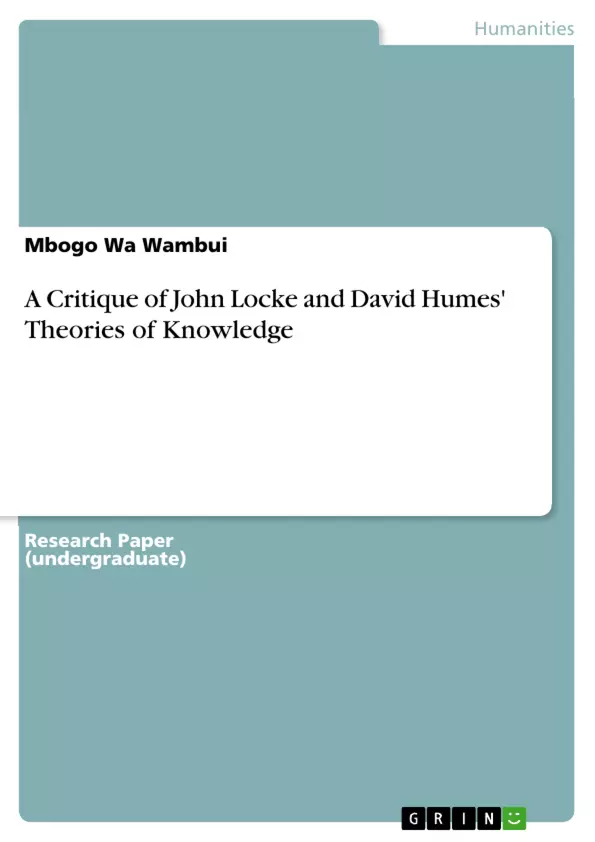British philosophers, John Locke and David Hume, are considered empiricists. This is because they based their philosophies on natural science. Both philosophers contributed to the theory of knowledge with Locke coming up with sensations and reflections and Hume coming up with impressions and ideas as the cornerstones of their theories of knowledge. Their theories aim to show us that everything we understand is by virtue of its connection with experience. Experience, therefore is the source of knowledge for these philosophers.
This paper looks into empiricism both as a source and method of knowledge. The approach taken is by mirroring John Locke’s theory of knowledge with that of David Hume, identifying similarities, influence of Locke on Hume, the differences between them and a critique on the credibility of empiricism, as one of the sources and methods of knowledge.
The conclusion arrived at is that empiricist ideas can explain the physical world and what we know of it but there remains rationally derived knowledge. On this account, both empiricism and rationalism are credible sources and methods of knowledge.
Table of Contents
- Abstract
- Introduction
- John Locke's Philosophy and His Theory of Knowledge
Objectives and Key Themes
This paper aims to compare and contrast the theories of knowledge of John Locke and David Hume, both considered empiricist philosophers. It examines their similarities and differences, analyzes Hume's potential influence from Locke, and critically evaluates the credibility of empiricism as a source and method of knowledge.
- Empiricism as a source and method of knowledge
- Comparison of Locke's and Hume's theories of knowledge
- Locke's influence on Hume
- Critique of empiricism
- The credibility of both empiricism and rationalism
Chapter Summaries
Abstract: This paper compares and contrasts the empiricist theories of knowledge of John Locke and David Hume, focusing on their similarities, differences, and the influence of Locke on Hume. It critically examines the credibility of empiricism as a source and method of knowledge, ultimately concluding that while empiricism explains our understanding of the physical world, rationally derived knowledge also exists, making both empiricism and rationalism credible sources of knowledge.
Introduction: This introductory chapter establishes the paper's objective: to compare and contrast the epistemological theories of Locke and Hume, both classified as empiricist philosophers. It defines empiricism as the view that experience, encompassing sensory experience and introspection, is the source and test of contingent knowledge, and introduces key concepts like sensation, reflection, impression, and ideas, which are central to both philosophers' theories. The chapter sets the stage for a detailed examination of Locke's and Hume's contributions to the theory of knowledge.
John Locke's Philosophy and His Theory of Knowledge: This chapter delves into Locke's theory of knowledge as presented in his *Essay Concerning Human Understanding*. It explores Locke's assertion that all our ideas originate from experience, categorized as sensation (external observation) and reflection (internal observation of the mind's operations). The chapter explains Locke's concept of the mind as a "blank slate" at birth, furnished with ideas through experience. It discusses how Locke's emphasis on sensory knowledge complements rationalism, highlighting his contribution to empiricist thought and laying the groundwork for the comparison with Hume's theory in subsequent sections (though those sections are not included in this preview).
Keywords
Empiricism, John Locke, David Hume, theory of knowledge, epistemology, sensation, reflection, impressions, ideas, experience, rationalism.
Frequently Asked Questions: A Preview of a Comparative Study of Locke and Hume's Theories of Knowledge
What is the main topic of this paper preview?
This preview summarizes a paper comparing and contrasting the empiricist theories of knowledge of John Locke and David Hume. It focuses on their similarities and differences, Hume's potential influence from Locke, and a critical evaluation of empiricism's credibility as a source and method of knowledge.
What are the key themes explored in the paper?
The key themes include empiricism as a source and method of knowledge; a comparison of Locke's and Hume's theories; Locke's influence on Hume; a critique of empiricism; and the overall credibility of both empiricism and rationalism.
What is included in this preview?
This preview provides a table of contents, objectives and key themes, chapter summaries (abstract, introduction, and a chapter on Locke's philosophy), and keywords.
What is the argument presented in the abstract?
The abstract argues that while empiricism effectively explains our understanding of the physical world, rationally derived knowledge also exists, making both empiricism and rationalism credible sources of knowledge. The paper compares and contrasts Locke and Hume's empiricist theories, analyzing their similarities, differences, and Locke's influence on Hume.
What does the introduction chapter cover?
The introduction establishes the paper's objective: to compare and contrast Locke and Hume's epistemological theories. It defines empiricism and introduces key concepts central to both philosophers' theories, such as sensation, reflection, impression, and ideas. It sets the stage for a detailed examination of their contributions.
What is covered in the chapter on John Locke's philosophy?
This chapter explores Locke's theory of knowledge as outlined in his *Essay Concerning Human Understanding*. It details his assertion that all ideas originate from experience (sensation and reflection), his concept of the mind as a "blank slate," and how his emphasis on sensory knowledge complements rationalism.
What are the key terms used in this paper?
Key terms include Empiricism, John Locke, David Hume, theory of knowledge, epistemology, sensation, reflection, impressions, ideas, experience, and rationalism.
What is the overall conclusion suggested by the preview?
The preview suggests that the paper will conclude that both empiricism and rationalism are credible sources of knowledge, with empiricism explaining our understanding of the physical world and rationalism contributing to other forms of knowledge.
- Quote paper
- Mbogo Wa Wambui (Author), 2011, A Critique of John Locke and David Humes' Theories of Knowledge, Munich, GRIN Verlag, https://www.grin.com/document/703980



